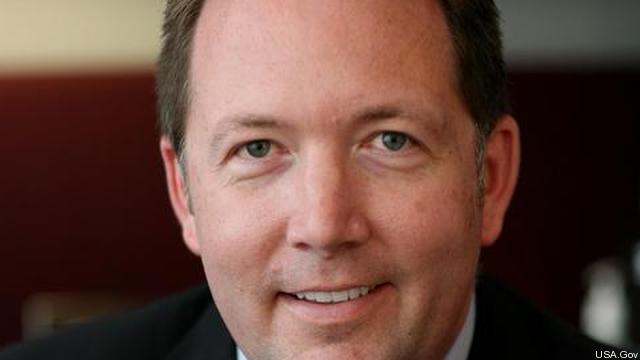Hey there. I’m Christopher Dorobek — the DorobekINSIDER — and welcome GovLoop’s DorobekINSIDER, where we focus on six words: Helping you do your job better.
Happy Friday…
And the big news on this Friday — the federal CIO, Steven VanRoekel, is stepping down from that post to return to U.S. Agency for International Development to help in the fight against Ebola.
Politico broke the story on Friday morning — kudos — and he confirmed on his Twitter feed.
https://twitter.com/stevenvDC/status/512915000201969664
VanRoekel starts at USAID on Monday.
I have linked to some of the stories about the departure below.
The surprise departure raises some important questions… not the least of which is — What will this mean for federal IT?
The assessments on VanRoekel’s tenure will be fleshed out in the days ahead but the general take has been… ‘whatever.’ There have been many in government IT who wondered if VanRoekel even wanted this job — a post that many dream of having. And, of course, we all remember the somewhat harsh assessment by PR maven Steve O’Keefe, who branded VanRoekel as a narcoleptic.
The consensus assessment is that VanRoekel just didn’t really care — and some insiders even believe that what he really wanted was to be OMB’s deputy director of management. Perhaps the most significant question: What will be VanRoekel mark coming from his three-year tenure?
The other big question: What will this mean to federal IT? The two top tech posts in the White House will have new people — former CTO Todd Park recently returned to California and the White House recently named former Google exec Megan Smith to that post… while VanRoekel’s duties will be assumed by his deputy, Lisa Schlosser.
VanRoekel issued a statement that seeks to define his own tenure (via Federal News Radio) :
“When taking the job of U.S. chief information officer, my goal was to help move federal IT forward into the 21st Century and to bring technology and innovation to bear to improve IT effectiveness and efficiency. I am proud of the work and the legacy we will leave behind, from launching PortfolioStat to drive a new approach to IT management, the government’s landmark open data policy to drive economic value, the work we did to shape the mobile ecosystem and cloud computing, and the culmination of our work in the launch of the new Digital Service, we have made incredible strides that will benefit Americans today and into the future,” VanRoekel said in a statement. “So it is with that same spirit of bringing innovation and technology to bear to solve our most difficult problems, that I am excited to join USAID’s leadership to help stop the Ebola outbreak. Technology is not the solution to this extremely difficult task but it will be a part of the solution and I look forward to partnering with our federal agencies, non-profit organizations and private sector tech communities to help accelerate this effort.”
More broadly, does the Obama administration care about governance and government management? The President has the President’s Management Agenda — a PDF from the FY2015 budget — which he only discussed last year. But this agenda doesn’t seem to drive budgets or agency decisions. The Obama management agenda is so opaque, it is virtually un-Googleable.
This seems like an opportunity for OMB’s deputy director for management Beth Cobert, a McKinsey alum, to move forward in some way.
And finally, there is a somewhat fun parlor game question: What’s the real story? The departure of Park and VanRoekel follows one of the most visible government IT disasters: HealthCare.gov. And while Park and VanRoekel were called to Capitol Hill to answer for the failures, they were widely chided for, as Federal News Radio put it at the time, shirking responsibility.
Some of the coverage:
- Breaking the story: Politico: W.H.’s Steve VanRoekel to take tech to Ebola fight
- FCW: VanRoekel stepping down as federal CIO
- Federal News Radio: Federal CIO VanRoekel leaving post for new role at USAID
- NextGov: US CIO Steven VanRoekel Steps Down
- FedScoop: U.S. CIO Steven VanRoekel Leaves To Help USAID Fight Ebola
Weekend reads
We know weekend time is precious, so we try to pull some stories throughout the week that are worth your time… and may just plant a seed for new ideas…
- Let Us Reintroduce You to GovLoop.com [GovLoop] GovLoop relaunched this week… get caught up on what you need to know
 GovLoop’s DorobekINSIDER Book Club: The Medici Effect: Breakthrough Insights at the Intersection of Ideas, Concepts, and Cultures by Frans Johansson… after a hiatus, I’m relaunching the DorobekINSIDER Book Club — think of the Oprah Book Club with books that are more wonky and focused on my favorite words: Help Government Do Its Job Better. With the Executive Leadership Conference coming up in a few weeks, at which Johansson will be speaking, we are going to discuss this book and what it means to government. More on how it works on Monday, but… more about the book: “Why do so many world-changing insights come from people with little or no related experience? Charles Darwin was a geologist when he proposed the theory of evolution. And it was an astronomer who finally explained what happened to the dinosaurs. Frans Johansson’s The Medici Effect shows how breakthrough ideas most often occur when we bring concepts from one field into a new, unfamiliar territory, and offers examples how we can turn the ideas we discover into path-breaking innovations.”
GovLoop’s DorobekINSIDER Book Club: The Medici Effect: Breakthrough Insights at the Intersection of Ideas, Concepts, and Cultures by Frans Johansson… after a hiatus, I’m relaunching the DorobekINSIDER Book Club — think of the Oprah Book Club with books that are more wonky and focused on my favorite words: Help Government Do Its Job Better. With the Executive Leadership Conference coming up in a few weeks, at which Johansson will be speaking, we are going to discuss this book and what it means to government. More on how it works on Monday, but… more about the book: “Why do so many world-changing insights come from people with little or no related experience? Charles Darwin was a geologist when he proposed the theory of evolution. And it was an astronomer who finally explained what happened to the dinosaurs. Frans Johansson’s The Medici Effect shows how breakthrough ideas most often occur when we bring concepts from one field into a new, unfamiliar territory, and offers examples how we can turn the ideas we discover into path-breaking innovations.”- Startup tips from Paypal founder Peter Thiel [CBS This Morning] In the interview, Thiel has given me one of my favorite questions: “The interview question I always like asking people is, ‘Tell me something that’s true that very few people agree with you on,'” he said. “Like, the education system is broken. Or God exists, or God doesn’t exist. But these are all sort of conventional answers. Good answers are ones that are very uncomfortable and take you out of your comfort zone.”
- Thiel’s new book: Zero to One: Notes on Startups, or How to Build the Future
- Outside the box thinking — giving homeless homes: Home Free? [The New Yorker] “In 2005, Utah set out to fix a problem that’s often thought of as unfixable: chronic homelessness. The state had almost two thousand chronically homeless people. Most of them had mental-health or substance-abuse issues, or both. At the time, the standard approach was to try to make homeless people “housing ready”: first, you got people into shelters or halfway houses and put them into treatment; only when they made progress could they get a chance at permanent housing. Utah, though, embraced a different strategy, called Housing First: it started by just giving the homeless homes.”
- Tim Cook Interview: The iPhone 6, the Apple Watch, and Remaking a Company’s Culture [BusinessWeek] With the release of the new iPhone, the Apple CEO talks about innovation and changing culture.
This week on GovLoop’s DorobekINSIDER:
- A New Era for Enterprise Architecture – what EA is, why EA matters, how EA can help
- Why we need to update the federal Senior Executive Service – insights from Jeff Neal, the former DHS chief human capital officer
- What are your #opengov challenges?
- Character: the Ultimate Success Factor? The DorobekINSIDER interview with CACI’s Jack London
- Seeing Green: TSP by the Numbers
- A Gov Exodus? Are You Leaving Too?





Leave a Reply
You must be logged in to post a comment.